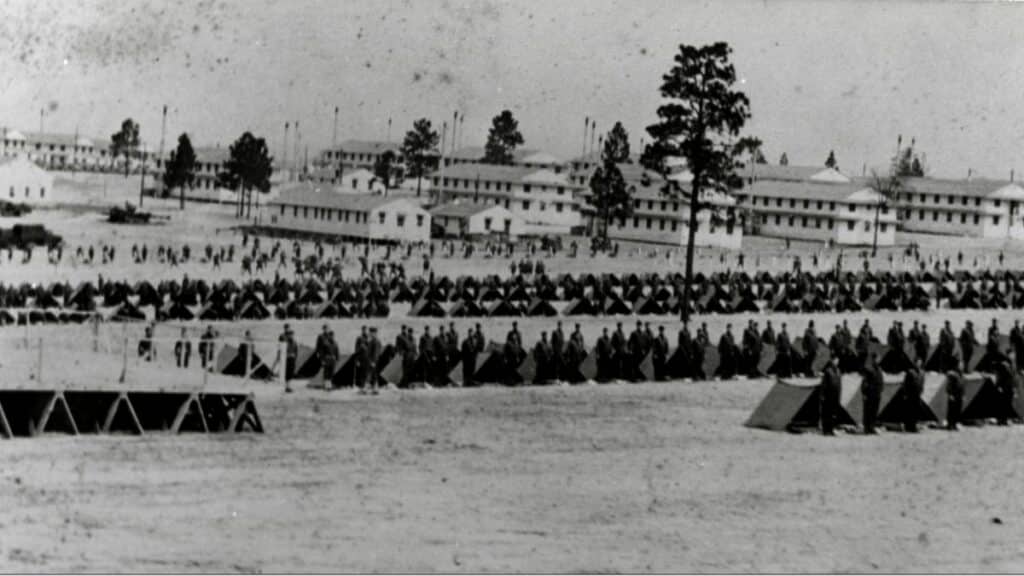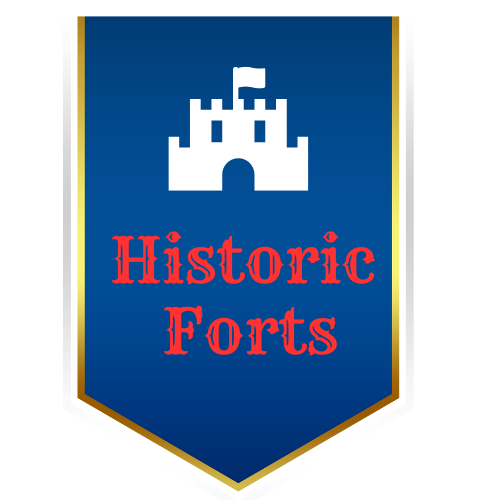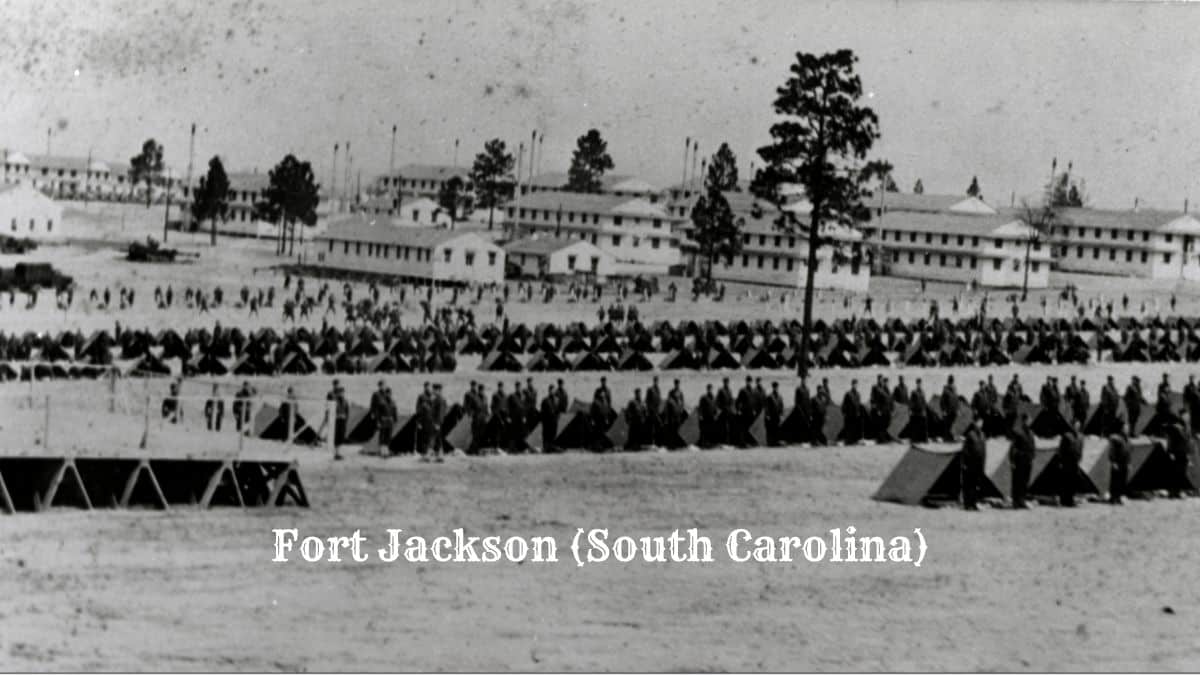Fort Jackson, located in Columbia, South Carolina, is the U.S. Army’s main Basic Combat Training center. It is the largest and most active of the Army’s training centers. This essential facility holds significant historical and operational value.
Established in 1917, Fort Jackson has grown to encompass over 52,000 acres. It features various training ranges and modern infrastructure. The base focuses on physical training and mental readiness, instilling essential values in recruits.
Fort Jackson’s strategic significance is underscored by its comprehensive training programs.
It supports the nation’s defense, ensuring soldiers are well-prepared. The facility plays a vital role in the military community in South Carolina and beyond.
History of Fort Jackson (South Carolina)

Fort Jackson in South Carolina has a rich history rooted in its founding and active participation in global conflicts. Notable periods include its establishment, involvement in World Wars, and significant post-war developments.
Founding and Naming
Fort Jackson was established in 1917. Named after President Andrew Jackson, this name honors his contributions to American history. The U.S. Army selected the location for its strategic advantages, availability of land, and accessibility.
During its early years, the fort prepared soldiers. It started with minimal infrastructure but rapidly developed to meet the needs of the growing military personnel.
World War I and World War II
Fort Jackson became a primary training ground for draftees in World War I. It facilitated the training of thousands of soldiers, ensuring they were prepared for overseas deployment.
World War II saw a much larger expansion. Fort Jackson’s infrastructure was significantly upgraded to handle the increased number of trainees. The facility trained hundreds of thousands, playing a crucial role in the war effort.
Post-War Developments
After World War II, Fort Jackson continued to grow. During the Cold War era, it remained a central training facility, focusing on modernizing its methods and infrastructure.
Improvements in amenities, housing, and training programs during the post-war period ensured that Fort Jackson remained a pivotal training site for the U.S. Army, adapting to new challenges and advancements in military technology and strategy.
Fort Jackson Today

Fort Jackson remains a critical institution for the U.S. Army, focusing on initial military training.
Located in Columbia, South Carolina, it profoundly influences local and regional economies, serving active-duty military personnel, families, and retirees.
Installation Overview
Fort Jackson is located in Richland County and covers approximately 52,000 acres. It houses a wide array of facilities aimed at supporting training and daily life.
The installation features numerous barracks, training grounds, recreational areas, and on-post schools.
Daily operations are supported by an estimated 10,000 active-duty soldiers and 3,500 civilians. The base provides essential services, including healthcare, shopping, and dining facilities.
Training Programs
Fort Jackson predominantly focuses on Basic Combat Training. Recruits undergo rigorous training encompassing physical fitness, weapons handling, and survival skills.
The U.S. Army Training Center operates here, providing structured courses designed to build combat-ready soldiers.
Advanced training programs are offered for specific military occupational specialties. The Professional Education Center and several specialized training regimens ensure that soldiers stay prepared for modern military demands.
Economic Impact
Fort Jackson has a significant economic influence. The base generates millions in revenue each year in Columbia and the surrounding areas.
Local businesses benefit from the needs of military personnel and their families, including housing, retail, and entertainment.
Employment opportunities on the base are also substantial. Thousands of civilian roles, from administrative to specialized technical jobs, support daily operations.
The presence of retirees in the area further augments the region’s economic stability.
Explore More: 10 Historic Forts in South Carolina
Army Training and Doctrine Command
Fort Jackson, South Carolina, plays a vital role in the Army’s training mission. It houses several essential training programs that prepare soldiers for their military careers.
Basic Combat Training
Basic Combat Training at Fort Jackson is the starting point for enlisted soldiers. It transforms civilians into soldiers through rigorous physical and mental activities. This phase includes obstacle courses, weapon training, and tactical exercises.
Field training exercises are crucial, allowing recruits to apply what they have learned in realistic scenarios. Trainees also undergo teamwork, discipline, and leadership lessons, which are essential for military success.
Advanced Individual Training
Advanced Individual Training follows Basic Combat Training, where soldiers gain specific skills for their military roles. This training occurs in specialized schools and units within Fort Jackson.
Here, soldiers focus on technical skills related to their chosen military occupational specialties (MOS). Instructors provide hands-on experience and in-depth knowledge, preparing trainees for future Army roles.
Drill Sergeant School
Drill Sergeant School at Fort Jackson trains soldiers to become the next generation of drill sergeants. This school emphasizes leadership, discipline, and instructional skills.
Candidates undergo rigorous evaluation to ensure they can effectively train new recruits.
Classes include physical fitness, drill and ceremony, and instructional techniques. Graduates from this program play a crucial role in shaping new soldiers and maintaining the Army’s high standards of training and discipline.
Supporting Facilities
Fort Jackson, South Carolina, hosts several critical support facilities that provide military personnel with essential training and resources.
These include the Soldier Support Institute, the Chaplain Center and School, and the National Center for Credibility Assessment.
Soldier Support Institute
The Soldier Support Institute (SSI) at Fort Jackson offers comprehensive training for soldiers in various administrative and logistical roles.
The SSI includes several schools, such as the Adjutant General School, Finance School, and the School of Music.
Each school focuses on specific aspects of soldier support, from human resources and financial management to military music.
Classes at SSI are designed to enhance the skills of military personnel, ensuring they are well-prepared to handle administrative tasks efficiently.
With state-of-the-art training facilities and experienced instructors, SSI plays a crucial role in maintaining the U.S. Army’s operational readiness.
Chaplain Center and School
The Department of Defense Chaplain Center and School is another vital facility at Fort Jackson. It provides training for chaplains and religious affairs specialists from all branches of the U.S. military.
The curriculum covers pastoral care, ethical leadership, and religious support in diverse and often challenging environments.
In addition to classroom instruction, the Chaplain Center offers practical training exercises to prepare participants for real-world scenarios.
This institution underscores the military’s commitment to ensuring spiritual care and moral guidance for its personnel.
National Center for Credibility Assessment
The National Center for Credibility Assessment (NCCA) is located at Fort Jackson and serves a specialized function within the Department of Defense.
It provides training and support in polygraph examinations and other credibility assessment techniques. The NCCA plays a key role in national security by ensuring personnel’s reliability and trustworthiness.
The center employs advanced methodologies and cutting-edge technology in its training programs, making it a critical asset for agencies requiring high standards of security and ethical assessment.
The NCCA’s work underpins many vital functions, ranging from counterintelligence to criminal investigations.
Military Life and Culture
Fort Jackson is a central pillar in the lives of soldiers and their families. It emphasizes the Army’s core values and a strong sense of community. It fosters disciplined and physically fit personnel while balancing military and family life.
Core Army Values
The Army’s core values are integral to Fort Jackson. These values include Loyalty, Duty, Respect, Selfless Service, Honor, Integrity, and Personal Courage.
They shape every soldier’s conduct and decisions. Discipline is paramount, ensuring that tasks are executed with precision.
Soldiers are expected to be motivated and maintain a high level of readiness. Honor underpins their actions, creating a cohesive and honorable military culture.
Day-to-Day Operations
Daily life at Fort Jackson revolves around rigorous routines and careful planning. Physical fitness is essential, with morning drills focusing on strength and endurance.
Soldiers engage in various training exercises designed to emulate real-life scenarios.
Readiness and adaptability are key traits developed here. Administrative tasks, equipment maintenance, and strategic planning are everyday activities.
The schedule balances periods of intense training with essential rest periods to maintain peak performance levels.
Community and Family Life
Community and family life are vital at Fort Jackson. It offers numerous support services for military families, including housing, healthcare, and recreational activities.
Various events and programs aim to build a closely-knit community where families feel welcomed and supported.
The Fort also provides resources to help families cope with the unique challenges of military life, ensuring they remain connected and resilient amidst dynamic military demands.
Training Elements and Activities
Fort Jackson’s training includes rigorous physical conditioning, combat skills, and leadership development. Each element builds endurance, enhances combat readiness, and fosters essential military qualities.
Physical Training and Fitness
Recruits undergo rigorous physical training to enhance strength, stamina, and overall fitness. Daily routines include endurance runs, obstacle courses, and calisthenics.
Key activities:
- Endurance Runs: To build cardiovascular strength.
- Obstacle Courses: To enhance agility and problem-solving under stress.
- Calisthenics: Focused on building core strength and flexibility.
Nutrition and hydration are critical components, ensuring recruits meet the physical demands of the training. The emphasis on teamwork and mutual support is crucial in building camaraderie.
Combat and Marksmanship Training
Recruits receive comprehensive combat techniques and marksmanship training to prepare for real-world scenarios. The training includes:
- Rifle Marksmanship: Essential skills in shooting accuracy and firearm safety.
- Land Navigation: Using maps and compasses to navigate unfamiliar terrains.
- Rappel Techniques: For quick descent from heights, essential in varied combat scenarios.
Safety and accuracy are paramount in these training sessions, ensuring each recruit is proficient in handling equipment under pressure. These activities also promote personal courage and integrity.
Leadership and Skill Development
Leadership training focuses on developing decision-making skills, accountability, and motivational abilities. Training includes:
- Leadership Drills: Practical exercises that simulate challenging situations.
- Skill Development Workshops: Covering communication, strategic planning, and conflict resolution.
Recruits learn to lead by example, emphasizing respect and teamwork. These skills are crucial in building capable leaders who can inspire and guide their peers under any circumstances.
Frequent evaluations and feedback help refine individual strengths and address areas for improvement.
Fort Jackson’s Influence and Contributions
Fort Jackson, a pivotal U.S. Army training facility, plays a crucial role in shaping military readiness. Its impact spans national and international communities through notable contributions and collaborative efforts.
National and International Impact
Fort Jackson’s significance stretches beyond South Carolina. As a major training center, it has trained countless U.S. Army soldiers who have served in various conflicts, including the Korean War.
This installation is vital for the U.S. Army’s operational readiness, producing well-trained soldiers ready for deployment worldwide.
The U.S. Army Soldier Support Institute, also located at Fort Jackson, provides essential training and education, enhancing the global efficacy of Army personnel.
Fort Jackson’s influence ensures consistent and quality training, making it a cornerstone of military preparedness in the U.S. and abroad.
Partnerships and Coalition Building
Fort Jackson maintains important partnerships with various organizations. Collaboration with the S.C. National Guard enhances state and local emergency preparedness.
These joint efforts ensure a seamless response during emergencies and bolster community resilience.
Moreover, partnerships with international allies support coalition building and training exercises. Such collaborations help to strengthen military ties and improve the effectiveness of multinational operations.
By fostering these relationships, Fort Jackson contributes to national security and promotes global stability and cooperation in military efforts.
Local Community and Environs
Fort Jackson, located near Columbia, South Carolina, is surrounded by a vibrant community and diverse surroundings. The area offers a variety of attractions and amenities, plus a notable presence of civil-military interactions.
Attractions and Amenities
Fort Jackson’s proximity to Columbia provides residents and visitors access to numerous attractions.
The Riverbanks Zoo is a popular destination featuring a range of exotic animals and botanical gardens. Meanwhile, the South Carolina State Museum offers exhibits on history, art, science, and culture.
Parks and outdoor spaces are also plentiful. Sesquicentennial State Park, for example, offers 1,400 acres of recreational facilities, including a lake, trails, and camping areas.
Shopping and dining options abound along Devine Street and Five Points, where visitors can find a variety of local and national retailers and diverse restaurants.
Civil-Military Relations
Fort Jackson’s relationship with the local community of Columbia is strong and cooperative. Fort Jackson is one of the largest and most active initial entry training centers in the U.S. Army, and it brings economic benefits to the area.
Many military families reside in Columbia, contributing to the local economy and culture.
Community events and partnerships also strengthen these ties. Programs like military appreciation days and community outreach initiatives help integrate service members into local life.
These interactions foster mutual respect and understanding between the military personnel and the residents of Columbia.

Cory is a website owner and content creator who enjoys fishing, history, coin collecting, and sports, among other hobbies. He is a husband and father of four.
Romans 15:4 For whatever was written in former days was written for our instruction, that through endurance and through the encouragement of the Scriptures we might have hope.

